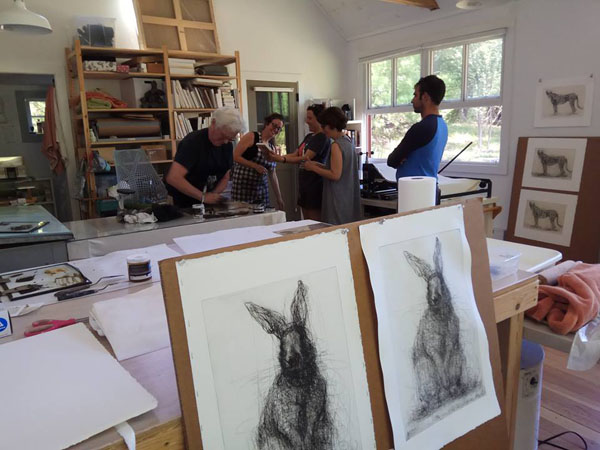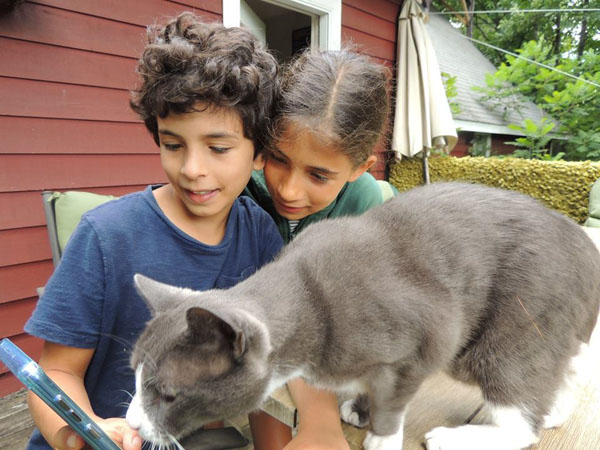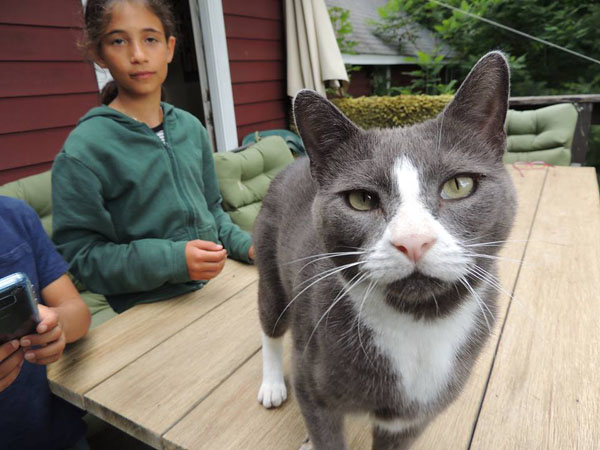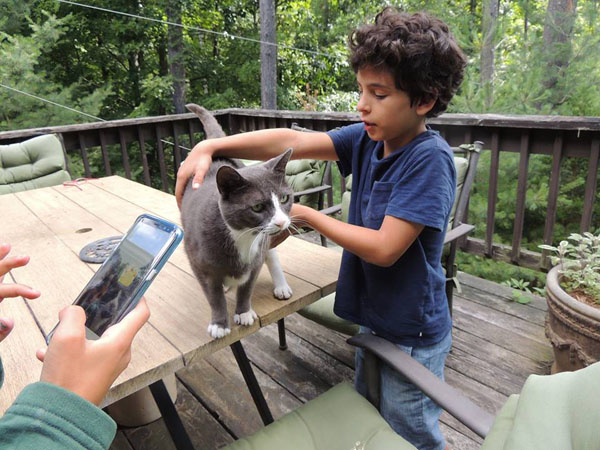|
|
|
pizza and Bach in Great Barrington
Saturday, July 21 2018
Gretchen and I haven't been sleeping well lately, and the result is that we tend to get out of bed very late in the morning. This morning, our guests were up much earlier than us (partly due to their respective jetlags). Eventually I staggered down the stairs all blurry-eyed and tried to figure out what to serve before Gretchen came down and made a proper breakfast of pancakes. There was some leftover banana cake from last night, so I kept cutting slices of it off, which the guests would then cut in half, quarters, eighths, etc. "You're performing 'Jewish Calculus," I observed. Surprisingly, they'd never heard this term. 'Jewish Calculus' is used to describe situations where there's a finite amount of some food, and one takes half of it, then someone else takes half of what remains, and so on until all that remains is a tiny crumb.
When Gretchen stumbled down the stairs, her brain was so marginal that she had to demand that people not talk to her as she made pancakes. Otherwise, she feared, she was sure she'd make a catastrophic ingredient error.
When the pancakes finally arrived, there had been no ingredient error, and we ate them out on the east deck. Gretchen had made a cashew-based cream "cheese" which was the perfect low-key condiment for them. There was also lots of coffee, which I drank perhaps a little too much of.
Meanwhile tiny Diane was playing with a dead (but seeminging uninjured) chipmunk in the dining room. It was freaking everyone out, but nobody did anything about it. Later when a subset of the household took the dogs for a walk in the forest, I buried the poor little guy in the garden.
Next we all went to Woodstock to fart around. I hadn't wanted to go, but Gretchen thought I should. Our first stop was Susan's studio on Chestnut Hill Road. Lately Susan has been doing printmaking using traditional techniques, and today she had a master printmaker there helping her out. We arrived just as they were about to make a print of a cheetah Susan had scratched made on two thin sheets of plexiglass: one with scratches for the creature's sketchy outline, and other with blobs of grit added for the spots. Both the scratches and blobs could hold ink, though the scratches would result in raised lines on the print while the blobs would result in depressions. The print was made in three passes in the press's roller, an ancient-looking machine capable of applying thousands of pounds per square inch. The result was an amazing print of a cheetah that clearly demonstrated the tangible superiority of old printmaking techniques over the pathetic simulation of, say, laser printing. That doing this was possible with two kids and Darla the dog (in full-on "lictopus" mode) causing so much distraction was a testament to the master printmaker's skill.
After a quick tour of the main house (and brief hello with David), we headed off to the Garden Café for lupper. We sat outside at a table for six, bemused that among all the people who had brought their dogs was a couple with a cat on a leash (that cat had to be put into a cat carrier when a black dog nearby started barking at her). I ordered an Abbey Ale and a burrito with jalapeños. The burrito came with so many fresh jalapeños that I actually couldn't eat them all (and broke out in a sweat).
During the meal, I happened to notice an interesting link and block of text posted by a former colleague (one who still works for Mercy For Animals) in the diaspora Slack. It was to a management advice consultancy called Reality Based Leadership, which apparently is now the latest thing affecting the thinking of the management at Mercy For Animals. The consultancy gives such advice as:
Resilient employees are willing to perform regardless of their circumstances.
Play favorites with employees who are driven and stop putting time and effort into employees stuck in chronic states of resistance.
What if a leader's role isn't to improve morale or motivate employees? What if a leader's role isn't to make sure all the employees are engaged and happy? What if these expectations set leaders up for failure?
you may have some employees who act like entitled victims. They focus solely on what they don't have and blame others when things don't go as planned. Their opinions about how to run your business simply aren't credible and should be discounted.
The key to turning employee engagement and satisfaction survey efforts into results is focusing your efforts on engaging your most valuable, accountable employees—not all employees.
Reading that, it's easy to see now why President Mahrise decided to fire the whole backend team. He had no idea what they did or what their significance was to the organization. All he knew was that they were in his way. Apparently "Reality Based Leadership" justifies all manner of authoritarianism, since anyone who knows more about something than the boss and tries to counsel him or her is "resistant" and should be let go. Under this strategy, existing relationships, particularly with sycophants, get stronger regardless of how strategically important they are, and weaker relationships corrode and die. There's no need for communication; underlings need to shut up and obey orders even if it means flying the airplane into a cliff.
The group private message into which this was posted included just two other people besides me: a close former colleague and Dan. We all agreed that this was pretty fucked-up stuff. It's ominous for an organization built around extending the goals of the enlightenment to fall into mindset that gave us Donald J. Trump.
After lupper, we walked over to the bookstore, since Gretchen always wants to take people there. On the way, a family that had been eating at another table at the Garden spontaneously offered a free bicycle to the kids. But they had to turn it down, since they live in Isræl. So then the family asked Gretchen if she wanted it. It turned out their lanky 17 year old had outgrown it, but it still fit Gretchen. Sure, Gretchen agreed, it would be good to have another bicycle. In exchange, Gretchen gave (or perhaps sold) the 17 year old a copy of one of her books.
The mishegoss at the bookstore went on much longer than expected. For a time, I thumbed through a coffee table book about R. Crumb. But eventually I went to fetch the car from the parking lot below The Garden. By the time I returned, Gretchen had the bike and was ready to go, and Dina & Family were on their way.
Back at the house, we had a little downtime before the next thing, so I took the opportunity to drink a little gin and apply for jobs.
"The next thing" was a drive out to Great Barrington to attend a performance at the Aston Magna Music Festival. Gretchen had bought tickets for a performance of The Art of Fugue, an arrangement of several of J. S. Bach's late fugues (and their permutations) on period-appropriate instruments. To get to Great Barrington, we crossed the Hudson at Rhinecliff, drove north on the Taconic Parkway for 20 miles, and then went east on Route 23. I narrowly missed being pulled over by a cop at the ramp to Route 23, but I'd apparently slowed down sufficiently in response to the frantic breaking of cars in front of me, and the smokey went after one of them instead.
The venue in Great Barrington was the Mahaiwe Performing Arts Center, a surpisingly big old-fashioned concert hall complete with a balcony and even high-end box seats near the stage. When we arrived, we waded through the sea of doddering grey-haired senior citizens to get our will-call tickets. We still had 20 minutes before the show, so we quickly ran off to a nearby co-op food store to get provisions: organic lemonade, numerous loaves of whole wheat bread, and (in case we had no other food options after the concert) tubs of prepared food such as garbanzo bean stew and Thai noodles.
Gretchen had bought our tickets back when I had a job, so she'd gotten us great seats: in the center of the balcony at the very front, with a perfect view of the stage. Tonight's performance brought, as previously indicated, a crowd old enough to make us feel young. Unfortunately, turnout wasn't great, and only about half the seats (at least near the stage) had been sold.
The small chamber group performing tonight consisted of about eight musicians. There was a guy with harpsichord, a baroque violin, a baroque viola, a baroque cello, a viola de gamba, and three musicians playing a period-appropriate flute, oboe, and bassoon. Those last three instruments were the most obviously exotic of all those on stage; they were all made of brownish wood and had holes that had to be covered with fingers (there didn't appear to have many metallic valves).
I'm not going to say I am a huge fan of J. S. Bach and his fugues. They're clever and mathematically interesting, and are perfectly listenable for a period of time. But tonight's performance was perhaps a bit more fugue than I would've ever otherwise sat through. But I could go into various mental states during the performance, and not all of those were depressing or otherwise unhealthy. That said, the sound of those period-appropriate instruments certainly left a lot to be desired. Baroque string instruments are quieter, buzzier, and produce tones with decidedly less body than today's classical instruments. There evidently has been real progress made, at least between the mid 1700s and the early 1800s. The viola de gamba is a particularly weak piece of equipment, with even Gretchen making the whispered observation about how much sense it made that it was no longer part of a normal orchestra. But my biggest beef was with the harpsichord. Given the tinny, unexpressive notes it produces, it's an awfully large piece of kit. By unexpressive, I mean that it doesn't sound like it has any dynamic range. You either produce a note or you do not, and those notes always have the same volume. The waveforms of those notes must resemble those of 1980s digital music equipment, because a harpsichord melody wouldn't sound out of place in a 1980s video game. Some of it also reminded me of an auto-play MIDI file blaring from an angel-encrusted web page back in 1997.
When the show ended and we were dumped out onto the street, we somehow managed to hurry past the herd of slowly doddering oldsters (I made a comment to Gretchen at their expense, though immediately copped to Gretchen's observation that that would be us some day). Most things in Great Barrington close at 10:00pm, but it wasn't quite that late, so we hurried down Main Street to Baba Louie's, a gourmet pizzeria that also has a place in Hudson (which we'd been to). Baba Louie's has great vegan options, and, unlike (say) Catskill Mountain Pizza, they don't just carelessly throw on toppings and hope for the best. The mushrooms are sauteed first, and the tofu cubes are first pan seared with soy sauce and olive oil. We ordered a pizza with soy mozzarella and cubes of that tofu. On my half, I had banana peppers and portobella [sic] mushrooms, while Gretchen got spinach, sundried tomatoes, and green olives on her half. I also had an "extra pale ale," though it tasted way too malty to have been anything like that. In any case, the pizza was an unexpected miracle of deliciousness, which (for me at least) made the whole drive out to Great Barrington worthwhile.
Driving home, Gretchen was behind the wheel, and we kept finding ourselves following slowpokes on two-lane roads. The 1.25 hour drive seemed to take fucking forever.

In Susan's studio, with some rabbit prints (from copper plates) in the foreground. From left: master printer, Susan, Gretchen, Dina, and Gilaud.

Darla on her bed in Susan's studio.

Celeste with the kids this morning, faking being a friendly cat and interested in what interests them. Normally she acts more feral.

One of the kids looks at me, and so too does Celeste.

The little boy considers picking up Celeste, but she is too heavy.
For linking purposes this article's URL is:
http://asecular.com/blog.php?180721 feedback
previous | next |




